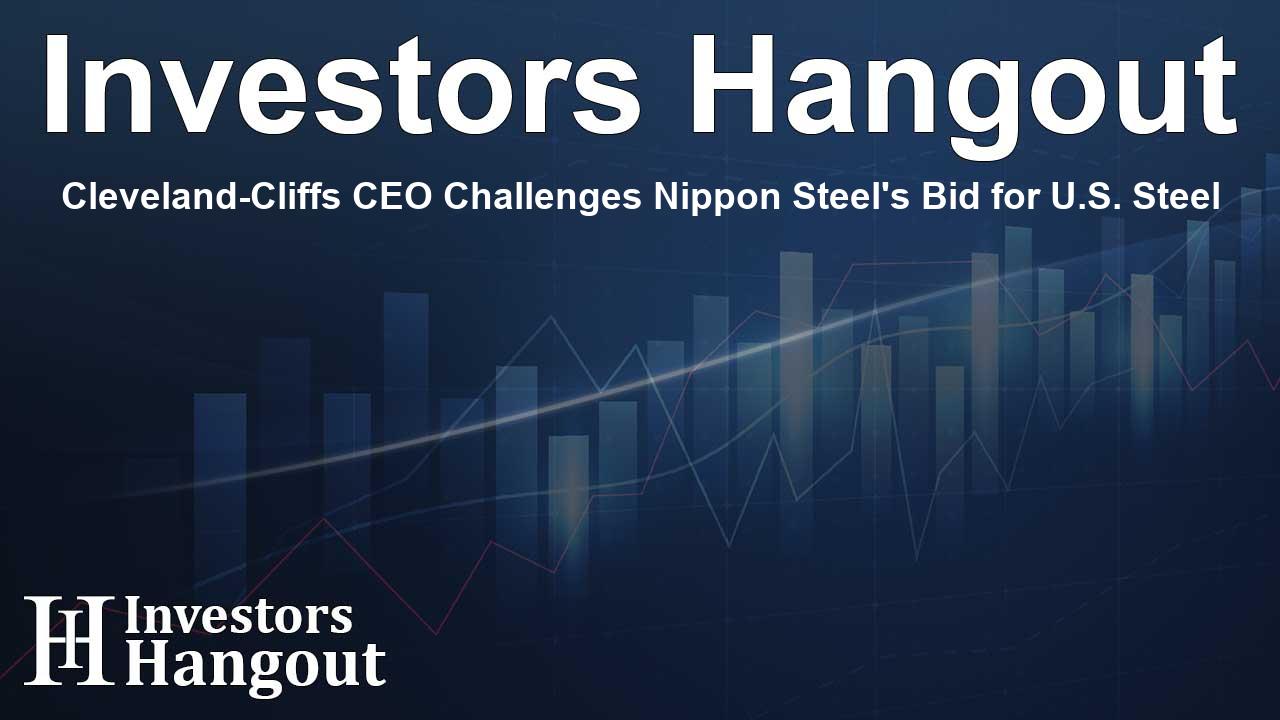Cleveland-Cliffs CEO Challenges Nippon Steel's Bid for U.S. Steel

Cleveland-Cliffs CEO Challenges Nippon Steel's Bid for U.S. Steel
As Nippon Steel continues to navigate the complexities of its ambitious $14.9 billion bid for U.S. Steel, it faces skepticism from both the Biden administration and an unexpected rival. The CEO of Cleveland-Cliffs, Lourenco Goncalves, whose company previously attempted a $7 billion acquisition of U.S. Steel, has raised significant questions about the viability of Nippon’s offer. This situation has caught the attention of investors and industry analysts alike.
Investor Doubts Cast by Goncalves
During several earnings calls and investor meetings, Goncalves explicitly shared his doubts regarding the likelihood of Nippon Steel's acquisition closing. His comments implied that political forces would ultimately block the deal, a sentiment he reiterated to investors well ahead of President Biden’s official announcement against the merger. On one call, he stated, “I can’t force U.S. Steel to sell to me, but I can work my magic to make a deal that I don’t agree with not to close.”
Timeliness of Goncalves' Statements
Notably, Goncalves’s foresight seemed to align with the timing of Biden's eventual opposition. The day after Goncalves offered his predictions, the President firmly expressed his disapproval, setting the stage for CFIUS's deeper investigation into the foreign acquisition. The Committee on Foreign Investment in the U.S. was unable to reach a consensus on the deal, ultimately passing the responsibility to the President, which significantly influenced the deal's fate.
Nippon Steel's Vision and Response
Nippon Steel had positioned its offer as a means to revitalize U.S. Steel's operations, pledging significant investments to enhance its facilities. The proposal was marketed as a way to create a more competitive landscape in the domestic market. Yet, it faced political headwinds, as both sides of the aisle voiced concerns about maintaining U.S. ownership of essential manufacturing capabilities.
Challenges from Antitrust Concerns
U.S. Steel raised alarms regarding potential antitrust issues, arguing that a merger with Cleveland-Cliffs could significantly reduce competition in the steel supply chain, especially for U.S. automakers. This apprehension played a pivotal role in the board’s decision to reject Cleveland-Cliffs' initial offer and further complicated Nippon’s pursuit of the acquisition.
Political Landscape and Reaction
The political climate surrounding the bids intensified as U.S. Steel's headquarters is situated in Pennsylvania, a state of considerable significance in both local and national elections. Statements from both Biden and former President Trump highlighted their commitment to keeping U.S. Steel as an American company, responding to concerns raised by key stakeholders, including labor unions.
Future Prospects for Acquisitions
In the wake of these developments, Cleveland-Cliffs has not shied away from expressing its continued interest in acquiring U.S. Steel. The competitive landscape is evolving, and there remains speculation about future bids that may emerge in an attempt to consolidate the steel industry. Goncalves's previous comments and the ongoing scrutiny over foreign investments suggest that the road ahead will still be challenging.
Conclusion: What's Next for U.S. Steel?
The saga surrounding Nippon Steel's bid highlights the intricate balance of market dynamics and national security concerns. Investors remain watchful as potential rivals, such as Cleveland-Cliffs, seek to carve out their paths in an ever-challenging environment. What remains clear is that the future of U.S. Steel is far from settled, with competitive pressures and political influences playing a decisive role in its fate.
Frequently Asked Questions
What are the key concerns regarding Nippon Steel's bid?
The primary concerns include national security implications and potential antitrust issues that could arise from the acquisition.
How did the CEO of Cleveland-Cliffs influence investor perceptions?
Goncalves frequently cast doubt on the likelihood of the acquisition closing, which likely influenced investor sentiment and stock prices.
What was the response from the Biden administration regarding the deal?
The Biden administration ultimately opposed Nippon Steel's merger with U.S. Steel, citing national security risks as a significant factor.
What challenges does U.S. Steel currently face post-bid?
U.S. Steel is navigating a complex landscape with potential rival bids and evolving market dynamics that impact its future.
Could Cleveland-Cliffs make another offer for U.S. Steel?
Yes, Cleveland-Cliffs has expressed ongoing interest in pursuing another bid, but the market and regulatory landscape will be crucial to consider.
About Investors Hangout
Investors Hangout is a leading online stock forum for financial discussion and learning, offering a wide range of free tools and resources. It draws in traders of all levels, who exchange market knowledge, investigate trading tactics, and keep an eye on industry developments in real time. Featuring financial articles, stock message boards, quotes, charts, company profiles, and live news updates. Through cooperative learning and a wealth of informational resources, it helps users from novices creating their first portfolios to experts honing their techniques. Join Investors Hangout today: https://investorshangout.com/
Disclaimer: The content of this article is solely for general informational purposes only; it does not represent legal, financial, or investment advice. Investors Hangout does not offer financial advice; the author is not a licensed financial advisor. Consult a qualified advisor before making any financial or investment decisions based on this article. The author's interpretation of publicly available data shapes the opinions presented here; as a result, they should not be taken as advice to purchase, sell, or hold any securities mentioned or any other investments. The author does not guarantee the accuracy, completeness, or timeliness of any material, providing it "as is." Information and market conditions may change; past performance is not indicative of future outcomes. If any of the material offered here is inaccurate, please contact us for corrections.